
Bharat Jodo Yatra, a success till now; can Cong build on it for 2024 poll?

There is a predictable sense of accomplishment within the Congress party over the completion of 50 days of the ongoing Bharat Jodo Yatra (BJY) and the steadily swelling people’s participation in it ever since it was flagged off from Kanyakumari on September 7.
With Congress leader Rahul Gandhi as its mascot, the 3,570-kimlometre yatra is presently passing through the Mahbubnagar district of Telangana. In the past 50 days, the Congress party’s biggest public outreach and mobilization campaign since Rajiv Gandhi’s Bharat Yatra of 1990 has covered a distance of over 1,300 kilometres, traversing through 18 districts in Tamil Nadu, Kerala, Karnataka and Andhra Pradesh.
Time to reflect
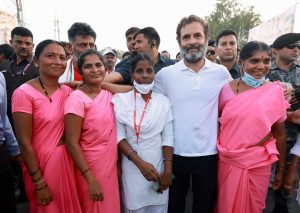
With some 100 days still to go before it concludes in Srinagar, this may also be a good time for Rahul and other Congress leaders involved in the yatra to reflect upon what the padyatra has achieved thus far, and what needs to be done henceforth to ensure that the assumed gains of the past 50 days aren’t neutralized once this long walk for Congress revival ends around February 2023.
Of the four states that the BJY has covered so far, the Congress is practically a non-electoral entity in two. In Tamil Nadu, it needs the crutches of the DMK for survival. In Andhra Pradesh, the state’s bifurcation during the UPA-era spelled electoral doom for the party and the Congress has shown no sign of recovery as yet.
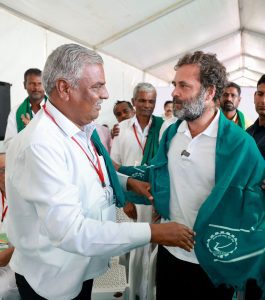
Of the other two states, the Congress is the principal opposition to the ruling Left government in Kerala and has a strong base in the state that sent Rahul Gandhi to the Lok Sabha in 2019 when his erstwhile seat and family turf of Amethi turned its back at him. Yet, the Congress in Kerala has been hemmed in by constant feuds among its warring leaders.
In Karnataka, the Congress is presently tipped as a favourite to defeat the ruling BJP as well as HD Deve Gowda’s Janata Dal (Secular) in the assembly polls due mid-2023, provided that the unity that its warring satraps D K Shivakumar and Siddaramaiah showed during the BJY earlier this month lasts until election season.
The yatra is currently passing through Telangana. Over the next 10-odd days, Rahul and his co-travellers will walk through Mahbubnagar, Shadnagar, Shamshabad, Hyderabad, Sangareddy and Madnoor before they enter Maharashtra around November 7. In Telangana too, the Congress is in the opposition and faces a stiff electoral battle end of next year not just against the ruling Bharat Rashtra Samithi of chief minister K Chandrashekhar Rao but also the BJP, which has been eying in-roads into the state.
Also read: Bharat Jodo Yatra: Telangana leg resumes after 4-day break
Need to keep the momentum
 In each of these states, the yatra has received a grand response giving it an aura of a real carnival of democracy as opposed to public rallies during election season where spectators are often brought in by political parties on the promise of a free meal or more. Yet, once the yatra has crossed the borders of a state, party insiders concede, there is a need for sustained follow up action by the local Congress leadership; one that is seemingly missing at the moment.
In each of these states, the yatra has received a grand response giving it an aura of a real carnival of democracy as opposed to public rallies during election season where spectators are often brought in by political parties on the promise of a free meal or more. Yet, once the yatra has crossed the borders of a state, party insiders concede, there is a need for sustained follow up action by the local Congress leadership; one that is seemingly missing at the moment.
“The onus is on the state leadership to ensure that the exercise of rebuilding the party and engaging with the voter continues. In Karnataka, Rahul successfully projected a united Congress but if Siddaramaiah and D K Shivakumar now go back to fighting each other instead of the BJP, all that we gained will be lost. Similarly, in Kerala, infighting needs to stop while in Tamil Nadu and Andhra we need to do a lot of work to rebuild the party at the grassroots,” a senior party leader, who has been walking in the BJY since it started from Kanyakumari told The Federal.
This leader lamented that “if you return to take stock of things in Tamil Nadu and Kerala today, you’ll find the state leadership napping once again”.
“The need for them is to return to every ordinary citizen, NGO, social group that participated in the BJY and engage with them till the next Lok Sabha or assembly election. Countless people came to meet Rahul in these states and they spoke freely about the expectations they have from the Congress. Many presented a memorandum, appeal or proposal for some help, assurance or support. We need to follow up on these to convince them that the yatra wasn’t just another political event but a vehicle for change,” the leader added.
Compared to the states already covered, the Congress believes the states where the yatra will move to after Telangana will be “more challenging politically”. “With the exception of Karnataka, none of the states we have covered so far has a major BJP presence. The states we will go to now are where we are in direct contest against the BJP and where we have failed miserably in successive elections not simply due to a lack of organisation but because the narrative and ideology we claim to represent has failed to win voter confidence,” a former Congress Lok Sabha MP from Rajasthan told The Federal.
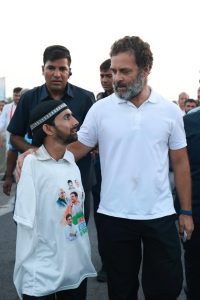
The ex-MP added, “most of the southern states have had an organic aversion to the BJP because it represents a monolithic Hindu identity politics that is diametrically opposite to the Dravidian, regional or linguistic identity politics that collectively shaped public discourse in Tamil Nadu, Kerala or even Andhra and Telangana… once we enter the central or north Indian states where BJP has homogenized politics around the idioms of Hindutva, Ram Rajya, gau raksha or Hindi chauvinism, we lose the advantage we have against the BJP in the south and are forced to go on the defensive.”
Ever since its rout in the 2014 Lok Sabha polls, the Congress has been sliding electorally and organizationally. The recurrent poll losses have substantially shrunk the party’s electoral footprint, which, in turn, has triggered a domino effect of attrition and organisational drift. Coupled with these challenges was the added burden on the Congress’s first family – the Gandhis – to counter the fast-gaining perception that the rot plaguing their party was the result of their own ineffectual leadership.
The crucial phase ahead
The states where the Congress’s existential crisis is most palpable are the ones where the BJY will now move towards once its southern leg ends in Telangana. Between now and February next year, the yatra will pass through Maharashtra, Madhya Pradesh, Rajasthan, Delhi, Uttar Pradesh, Haryana and Punjab before finally concluding in Jammu and Kashmir. Barring Rajasthan, the Congress is out of power in all these states.
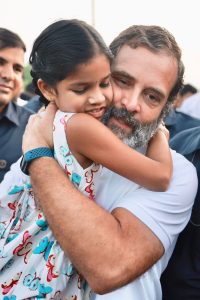
Of the 217 Lok Sabha seats across these eight states, the Congress currently holds just 11 seats – eight of them from Punjab alone and one each in Madhya Pradesh, UP and Maharashtra. It is the BJP’s principal rival in Haryana, Rajasthan and MP, has lost its citadels of Delhi and Punjab to the AAP and has been marginalized by the BJP and regional outfits in UP, J&K and Maharashtra. Then there are states like Bihar, Jharkhand, Odisha, Gujarat, Assam, Bengal, the entire north-east, where the Congress is either marginalized or is barely surviving but where the yatra won’t be going.
Congress leaders admit that barring the BJY there is no other concrete plan that the party has been able to draw up as yet which has the promise of revitalizing the party in any of these states. “Undoubtedly, the BJY has been a roaring success but what after it ends? The yatra gives Rahul and the party an opportunity to present our vision of India to the people and to boost the sagging morale of our workers but the yatra will end in February 2023, which means we have to then sustain whatever momentum we gain for another 12 to 14 months before the 2024 Lok Sabha polls. How we are going to do that is what we need to work on now and not after the yatra is over but as things stand today, I don’t see this happening,” said a Congress leader who was the party’s in-charge of a key Hindi-belt state until recently.
Yatra planned in detail
 Congress leaders who planned the BJY have meticulously briefed Rahul on issues he must speak or enquire about while meeting varied groups of people each day of the yatra or when he addresses a gathering at the end of the day’s walk. Groups of people from different walks of life and social strata – tribals, fisher folk, people who lost their kin to COVID, academicians, rights activists, small and medium business owners, farmers, labourers, etc. – have been meeting Rahul during the yatra and the discussions invariably end with the Congress leader assuring his visitors of every possible help.
Congress leaders who planned the BJY have meticulously briefed Rahul on issues he must speak or enquire about while meeting varied groups of people each day of the yatra or when he addresses a gathering at the end of the day’s walk. Groups of people from different walks of life and social strata – tribals, fisher folk, people who lost their kin to COVID, academicians, rights activists, small and medium business owners, farmers, labourers, etc. – have been meeting Rahul during the yatra and the discussions invariably end with the Congress leader assuring his visitors of every possible help.
These interactions, party sources say, are being carefully recorded by Rahul’s colleagues in the yatra. Several of the suggestions and recommendations that are being made could find their way into the Congress’s manifesto for the Lok Sabha polls or different assembly elections. “By the time the yatra ends, we believe we will have collected feedback from every segment of India’s population and this will give us a solid base to devise our election campaigns not just nationally but even at constituency level. What will then be importance is that our leaders engage with the people based on the inputs we have gathered… this is something that Rahul can’t do alone; all of us will have to do our bit,” a party leader involved with the yatra’s planning told The Federal.
Also read: Bharat Jodo Yatra: The meticulous record-keeping by Team Rahul
Congress members believe a direct outcome of this exercise will also be a rekindling of the public’s faith in Rahul. It is no secret that Rahul’s personal image has been as much a captive of his shortcomings as an archetypal politician as it is of a narrative spun by his rivals, particularly from the BJP.
The BJY seems to have succeeded to some extent in extracting Rahul from this image trap. Where Rahul was criticised for being inaccessible, he is now being applauded for spending each of the past 50 days freely mingling with party colleagues and the hoi polloi alike, raising important issues such as rising unemployment and economic distress and giving a clarion call for a united fight against a politics that breeds communal and social divisions, inequality and crony capitalism. His padyatra is now being projected as a march of penance and an unprecedented effort in contemporary Indian politics by a leader who is walking from Kanyakumari to Srinagar with a noble mission of healing the wounds of communal, social, regional and economic disharmony and strife.
Freedom from daily party affairs
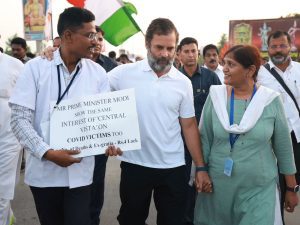
With his party now getting a full-time chief in Mallikarjun Kharge, duly elected to the post by party members and not anointed through nomination or dynastic decree, Rahul is also trying to showcase himself at par with any other foot soldier of the Congress whose role in the party “will be decided by the Congress president”. Kharge’s election also gives Rahul the freedom to spend more time among the public instead of being cooped up at his Tughlaq Lane residence in Delhi, micro-managing affairs of the party.
Given that it is virtually impossible to de-lineate Rahul from the Congress, irrespective of who officially holds the title of the Congress president, the party is hopeful that this newly found goodwill for its former party chief will also bring electoral rejuvenation for the Grand Old Party. Jairam Ramesh, the Congress’s communications department chief, has repeatedly asserted that though the yatra is aimed at raising issues of national and public importance, there is a “strong political element” to it, riding on which is the ultimate hope of an electoral revival in the 2024 general election.
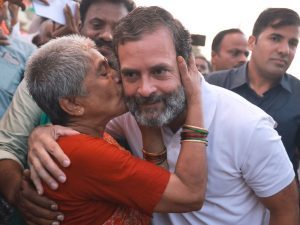
Also read: 30 km of Bharat Jodo Yatra daily: Secret of Rahul’s energy and calm
With one-third of the yatra’s proposed route now covered, Ramesh believes “the desired purpose and objectives with which the Bharat Jodo Yatra was started is being achieved.” While this may be true for now, it’s equally important for the Congress to remember that political gains can be lost much faster than they have been gained and there’s a lot more that the party still needs to do for its revival before claiming ‘Mission Accomplished’.

